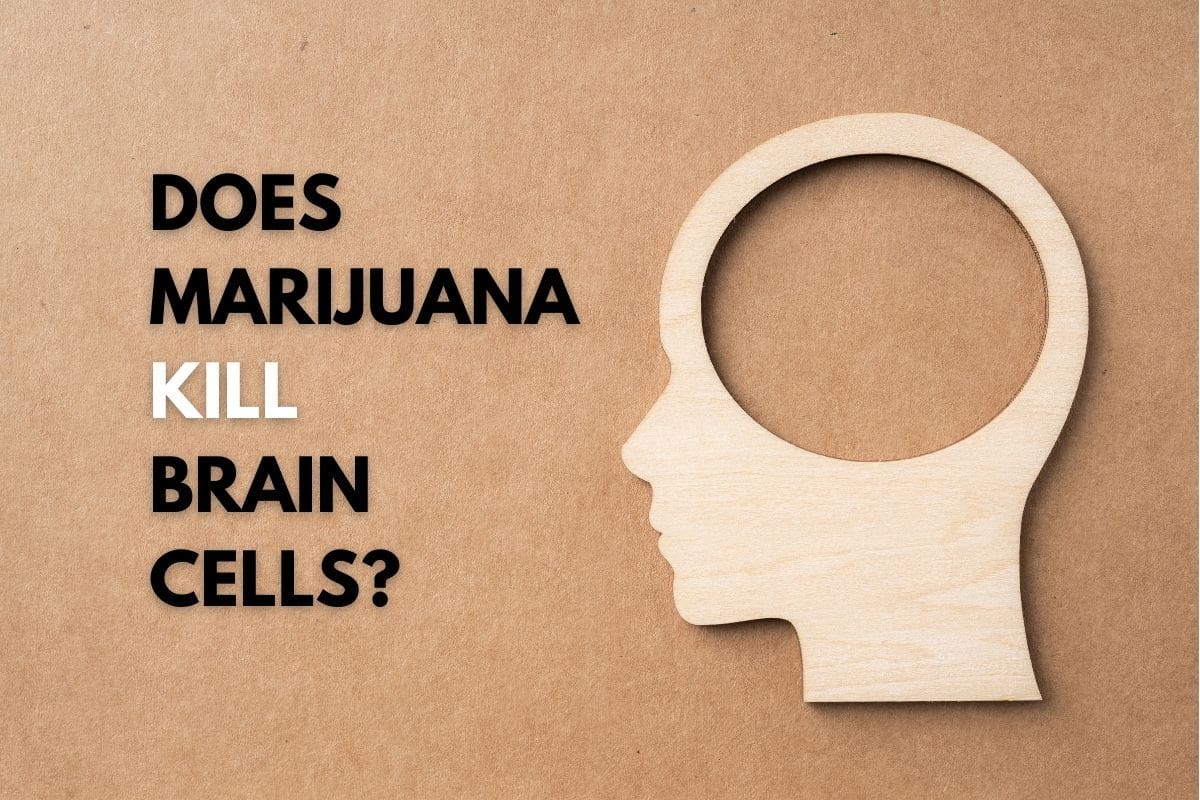What are the side effects that come to mind when you think of marijuana use? Most likely giggling, slowed speech and movements, and a sudden craving for snacks. This bumbling stereotype might lead you to believe that marijuana makes you dumber, but the scientific consensus seems to be that marijuana does not kill brain cells. This doesn’t mean that marijuana is harmless, however.
While weed doesn’t directly result in the death of the neurons the way that stress, head trauma, or other types of substances can, it can still go on to cause significant—and long-lasting—damage. This brain damage can lead to permanent side effects such as impaired memory, mental illness, and in the case of adolescents and their still-developing brains, a lower IQ.
How Marijuana Works
THC (delta-9-tetrahydrocannabinol), marijuana’s primary psychoactive ingredient, is a highly potent chemical that takes effect within seconds. Once in the body, THC connects with and slows down the communication between cannabinoid receptors, located primarily in the basal ganglia, cerebellum, hippocampus. These regions of the brain respectively control unconscious muscle movements, coordination, and memory, and are also the ones that take the biggest hit in terms of long-term effects.
This system that marijuana is able to exert influence on is known as the endocannabinoid (EC) system. It affects virtually every part of the brain, including the amygdala (emotion regulation), brain stem (pain sensitivity), and hypothalamus (hunger and sexual impulses), all of which are responsible for those hallmark signs of a marijuana high.
4 Ways That Marijuana Affects Cognition
Any type of prolonged use of a psychoactive substance has the potential to cause neurological imbalances or impairment—and marijuana is no exception. The exact nature and extent of brain damage or other lasting effects can depend on a number of factors including:
- Age
- Frequency of use
- Strength of the dosage
- Pre-existing mental illness or genetic predisposition to mental illness
Though marijuana may not be as overtly damaging as alcohol, meth, or cocaine (substances that drastically alter brain chemistry and uncoincidentally, are highly addictive), there are still plenty of undesirable cognitive side effects to be had.
- It shrinks your brain
Numerous studies conducted over the past few decades have found that years of chronic cannabis use resulted in significant reductions in gray matter volume. Gray matter is the neuron-dense part of our brain, which is largely responsible for our capabilities to learn and otherwise function. One particular study found that heavy cannabis use resulted in shrinkage of hippocampus and amygdala parts of the brain which can significantly impact memory and learning.
- It lowers your IQ
A New Zealand study involving over 1,000 teenagers had them take an IQ test at age 13 and then again at age 38 and also inquired as to their drug use habits. The study found that those who used marijuana at least four times a week experienced an average IQ drop of 8 points during this period. This experiment is the first of its kind to confirm that marijuana usage can directly contribute to loss of intelligence. The results also highlight the significance of frequency when it comes to the likelihood of severe or lasting side effects. However, there was one finding that overshadowed all the rest…
- It can stunt brain development in young people
That same study found that the most significant factor was when those participants began using marijuana. Those who started smoking as adults rather than teenagers faced no decrease in IQ. Adolescents with their still-developing brains have the most to lose cognitively. Rather than killing off brain cells, however, marijuana impedes brain development, putting young adults at a number of neurocognitive deficits (the human brain isn’t fully developed until age 25).
The younger a person starts using, the greater the reduction of their brain size—the prefrontal cortex specifically). While there is still much to understand about the specific parts of the juvenile brain that are impacted and why, many other drug studies have shown that younger introduction to drug use can make individuals more prone to mental illness and addiction, in addition to cognitive impairment.
- It can affect your perception of reality
Many mental illnesses are a result of either too much or too little dopamine in the brain. Marijuana has been found to result in lower dopamine activity in chronic users. This can cause psychotic symptoms similar to that of schizophrenia: anxiety, paranoia, and hallucinations. Known as cannabinoid-induced psychosis, it makes it difficult, if not impossible, to retain one’s grasp on reality and also represents a greater dysfunction with the brain’s processing that also severely impacts cognition. In other studies, student-age marijuana users experienced “slower processing speeds, poorer verbal learning and memory, and sequencing abilities”.
Although this phenomenon isn’t exclusive to weed smokers, they do face the greatest risk. Approximately 15% of marijuana users experience these psychotic symptoms (otherwise known as a “bad high”). Most will only experience these adverse side effects while intoxicated, but others go on to find themselves permanently afflicted, which would then fall under the label of a true drug-induced mental illness.
The Downsides of Marijuana
The rising prominence of medical and recreational-use marijuana has led to an erroneous belief that weed can’t be harmful. Although it comparatively carries fewer risks than other substances, it’s by no means a “safe” drug. Unfortunately, those for whom marijuana poses the most risks also make up the majority of its user base. If you know a teenager or college student with an addiction, getting them help isn’t just important for their physical health, but their cognitive abilities as well. Learn more about addiction resources for college students and how you can help.

































